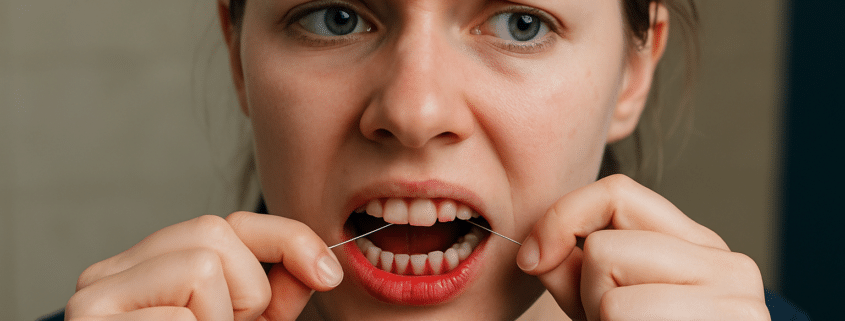Why Do My Gums Bleed When I Floss? Here’s What It Could Mean
You’re doing the “right” thing—flossing daily like your dentist says—and suddenly, there’s blood. Cue panic. Should you stop? Push through? Call 911? Not quite.
While bleeding gums might seem like a red flag (literally), they’re not uncommon. But that doesn’t mean they should be ignored. If your gums bleed when flossing, your body’s trying to tell you something—and this blog is your cheat sheet to decoding that message.
TLDR – Quick Guide
- Bleeding gums when flossing is often due to inflammation from plaque buildup or improper technique.
- It can also be a sign of gum disease, vitamin deficiency, or even hormonal shifts.
- Mild bleeding that resolves with better hygiene is normal. Ongoing or painful bleeding isn’t.
- Professional cleanings and exams can catch and treat underlying issues early.
Detailed Breakdown: Why Your Gums Might Bleed When Flossing
1. Gingivitis: The #1 Culprit
When plaque sits along the gumline, your body reacts with inflammation. This is gingivitis, and bleeding is often its first symptom. It’s reversible, but if ignored, it can evolve into full-blown gum disease.
According to the CDC, nearly 50% of adults over 30 have some form of periodontal disease.
2. You Just Started Flossing Again
If flossing isn’t your daily habit, starting up again can irritate gums and cause minor bleeding. Think of it like sore muscles after a workout. Keep going—gently—and it should stop within a week.
3. Poor Flossing Technique
Aggressive flossing or snapping the string into your gums does more harm than good. Proper flossing involves gliding the floss gently between teeth and hugging each side.
4. Vitamin Deficiencies (Especially Vitamin C and K)
Your gums need nutrients, too. A lack of vitamin C can lead to inflamed, bleeding gums, while vitamin K is crucial for blood clotting. Diets low in fresh produce or those with absorption issues may be at risk.
5. Hormonal Changes
Pregnancy, menstruation, and menopause can all increase gum sensitivity due to hormonal fluctuations. “Pregnancy gingivitis” is real and affects many women.
6. Gum Disease (Periodontitis)
If the bleeding is accompanied by gum recession, persistent bad breath, or loose teeth, it may be periodontitis—a serious gum infection that requires professional treatment.
7. Medications
Blood thinners, anti-inflammatories, and certain anti-seizure medications can make gums more prone to bleeding. Always tell your dentist about any prescriptions you’re taking.
When to See a Dentist
If your gums bleed when flossing for more than a week—even with perfect technique—it’s time to get evaluated. Red flags include:
- Swelling or pain
- Bleeding while brushing
- Receding gums
- Persistent bad breath
- Loose teeth
Clinics like Valery Sweeny, DDS in Los Angeles specialize in identifying early gum issues and providing personalized care before it escalates into something worse.
How to Fix It: Smart Steps to Stop the Bleeding
- Improve Technique: Use a gentle, C-shaped motion when flossing.
- Stay Consistent: Floss daily, even if you’re bleeding—it should improve over time.
- Upgrade Your Tools: Soft-bristled toothbrushes and waxed floss can reduce irritation.
- Clean Professionally: Schedule a dental cleaning to remove tartar and plaque.
- Check Your Diet: Add more leafy greens, citrus fruits, and vitamin-rich foods.
- Talk to Your Dentist: Especially if you’re on medications or have chronic symptoms.
Key Takeaways
- Bleeding gums during flossing are usually caused by inflammation or poor technique.
- It’s often the first sign of gingivitis—and a warning to step up your oral care.
- Hormonal changes, diet, and medications can also play a role.
- If bleeding lasts more than a week, get it checked—especially if there are other symptoms.
- Dental offices like Valery Sweeny, DDS in LA offer preventative and periodontal care to keep gums healthy long-term.
FAQs
Should I stop flossing if my gums bleed?
No. Keep flossing gently. The bleeding often subsides after a few days of consistent care.
How long should I give it before seeing a dentist?
If bleeding persists for more than 7–10 days, book a dental exam.
Is bleeding always a sign of gum disease?
Not always. It can be from flossing too aggressively or hormonal changes—but it should still be evaluated if it continues.
Can I use a water flosser instead?
Yes. Water flossers are gentle on the gums and can be a great alternative, especially for sensitive mouths.
What if only one area bleeds when I floss?
That could signal localized irritation or an issue like a cavity or tartar buildup. Get it checked out.




Leave a Reply
Want to join the discussion?Feel free to contribute!